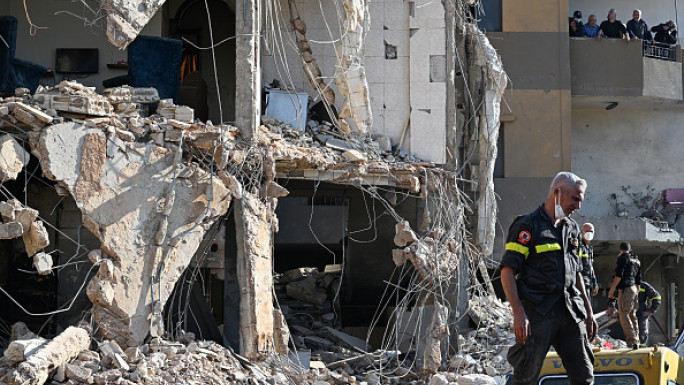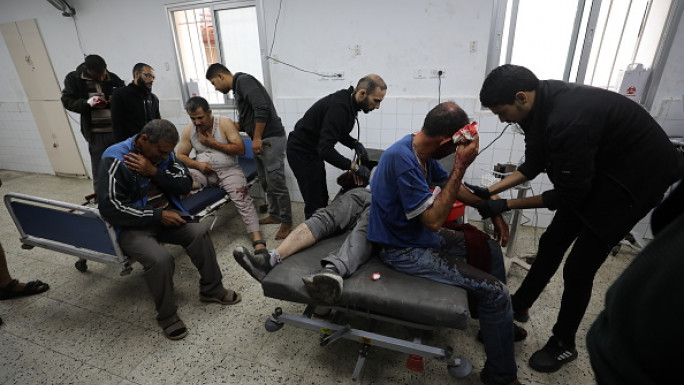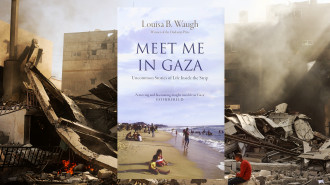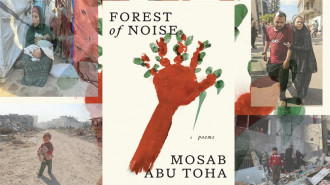
The story of Abdelkrim: The Moroccan journalist exploring his roots through the Lion of Rif's legacy

“Who am I? I needed to know my roots,” Moroccan Dutch journalist Karim Amghar tells The New Arab about the reasons behind his doc-series The Story of Abdelkrim, focusing on the iconic Rif leader, Abdelkrim El Khattabi.
Being a journalist is a life journey of seeking answers from sources and officials. Karim Amghar, a Moroccan Dutch journalist, spent years of his career researching the situation of Muslims in the West, analysing radicalisation, and debating the importance of education in building a better world.
"Being a father himself loudened the echo of his identity dilemma, as understanding who he is, became a necessity for Karim to teach his five and seven-year-old daughters about their roots"
However, one unanswered question kept haunting him: “Who is he?” A Moroccan Rifi Amazigh Dutch, a hotchpotch of identities where historical controversies loom behind every question.
Born in a predominantly white horticultural village of Bleiswijk, Karim learned about the founding father of the Netherlands Willem van Oranje and the Dutch polymath Piet Hein at school, but nothing about his Amazigh ancestors' battles against colonisation.
Like tens of thousands of Riffians, Karim’s father immigrated to the Netherlands seeking a better life for his family and Karim was the first child of the family to be born in a European country.
Being a father himself loudened the echo of his identity dilemma, as understanding who he is, became a necessity for Karim to teach his five and seven-year-old daughters about their roots.
"Born in a predominantly white horticultural village of Bleiswijk, Karim learned about the founding father of the Netherlands, but nothing about his Amazigh ancestors' battles against colonisation"
“I am a father of two young girls. I try to speak to them in Tamazight, but most of the time we end up just using Dutch. Now whenever they visit their grandmother, they struggle to understand her. I need to work on that more,” he said laughing.
As the question became unavoidable, Karim resorted to reading about the history of the Rif himself, and the first icon he came across was Abelkrim El Khattabi.
“I have always heard of him, but I did not know much about his legacy (...) of course I am not comparing myself to the lion of Rif, but I felt that I share a bond with him: the name, the identity, the fire,” Karim told The New Arab.
The lion of the Rif, who inspired colonised people from the Atlas mountains to Latin America to stand up against oppression and injustice, started his career as a journalist himself.
Born in 1882 in Ajdir, a small village in the north of Morocco, Abdelkrim was a promising student at the oldest university in the world, Qarawin in Fes.
He worked as a journalist for the Spanish newspaper Telegram del Rif before being appointed by the Spanish authority as the chief judge of Melilla in 1914. Abdelkrim was arrested several times for his anti-colonialism activities, but it was until 1921 that he engraved his name in the history of Maghreb.
"Marking the first major victory of indigenous people over a European coloniser, Abdelkrim pumped hope of liberation in a world where defeating the coloniser seemed unreachable"
With some 124 rifles, which were considered outdated for his time, El Khettabi initiated a military campaign against the Spanish army that ended with the liberation of the Rif region in the Anoual battle.
Marking the first major victory of indigenous people over a European coloniser, Abdelkrim pumped hope of liberation in a world where defeating the coloniser seemed unreachable.
Occupying the other part of Morocco, France saw in Abdelkrim a dangerous opponent as he aspired to liberate the rest of the Maghreb.
Through the use of mustard gas, chemical weapons, and a huge army numbering an astounding 250,000 soldiers, France and Spain forced Abdelkrim to surrender and exiled him to the island of Réunion where he lingered until 1947 when he gained asylum in Egypt.
Abdelkrim, who believed that “there must be no compromises when seeking freedom,” refused to go back to Morocco after gaining independence in 1954, as foreign military bases remained in the Kingdom.
In Cairo, the Lion of Rif founded the Committee for the Liberation of the Maghreb to reunite all the forces and the national parties struggling for the independence of Morocco, Algeria, Libya, and Tunisia, laying the foundations of a Maghrebian unity – a dream he died before reaching.
The legend of El Khettabi continued to inspire the oppressed around the world from Ernesto Guevara in Cuba, to the Hirak Rif uprising in North Morocco.
El Khettabi’s legacy and insistence on justice inspired his compatriots to uprise against the state’s inequity and corruption in 2016, after a Rifi fishmonger was crushed to death inside a garbage truck, under police watch, as he climbed in to retrieve his shipment of fish that was confiscated by authorities.
Despite the alleged good relationship that tied Khettabi and former Moroccan King Mohammed VI, the palace relationship with the Rif has always been tense, since former King Hassan II described Rifis as “despicable”.
For many Rifis, the male voice yelling “crush him,” in the background of the video that documented Fikri’s death, echoed “the neglect and despise approach” the state followed for decades in the cities of the mountainous region.
“I was running in Porto, Portugal. By sea you can be in Morocco in no time. While running, the ideas came. I thought: the Hirak is demonstrating strongly – and for what? They want three basic things: good health care, good education and employment. It's crazy that they can't get that,” Karim told The New Arab.
Outstood by the events in his homeland, where he spent many vacations without touching the bursting in anger part of Rif, the 32-year-old journalist decided that the real answers about his roots can only be found where the story first started “Jbal Rif” (mountains of Rif).
“Living in the West, sometimes you cannot escape the West’s vision of portraying events even if they are happening in your homeland. That’s why I decided to head to Morocco to explore my identity, and I decided to document my journey for those who cannot go themselves,” Karim added.
Through three episodes in his documentary, The story of Abdelkrim, Karim explored the Moroccan Amazigh community, from the north to the south, in its strength and its weakness, as it clings to its heroic history, while the beauty of its traditions continues to survive the rigid poverty and illiteracy in the region.
Ga jij ook kijken?? Zondag 22:50 @NPO2 @omroepntr .. "Het Verhaal Van Abdelkrim" Mijn nieuwe docu serie voor de NTR.. pic.twitter.com/oOrVe2rzX0
— Karim Amghar (@KarimAmgharNL) December 30, 2021
“After filming the series, I got to know myself better, I felt like I was reborn as a more self-aware person,” Karim said with a smile on his face.
The series, which was broadcasted on Dutch national TV earlier this year, evoked controversial reactions on social media, as some Amazigh community members argued that Karim did not do justice to Abdlkrim and the Rifi cause.
“Some people blamed me for calling the Rif north of Morocco. I believe that Abdelkrim, who yearned for Maghreb unity, wanted to unite people, not divide them. However, I was happy when many Dutch Amazigh parents called, thanking me for representing Abdelkrim to their children,” Karim said.
“We don't know Abdelkrim in Europe. Moroccan Dutch do not really know him. He is not talked about because in Europe there is a huge fear around that man,” he added.
Karim Amghar, who devoted many years of his career helping in reforming the education system in the Netherlands, hopes that one day he will share his experience in education with the Amazigh and Moroccan communities.
“Unfortunately, I do not speak Darija (Moroccan dialect) nor French, I only speak Tamazight, but I hope that one day I will be able to help my Amazigh people build a better education system," he revealed.
"I believe in the power of education to build a better world for everyone.”
Basma is The New Arab’s Morocco correspondent, covering local affairs and social and cultural events in the Maghreb region. She began her career as a journalist in a Moroccan anglophone outlet, before joining the New Arab in 2022.
Follow her on Twitter: @elattibasma





 Follow the Middle East's top stories in English at The New Arab on Google News
Follow the Middle East's top stories in English at The New Arab on Google News


